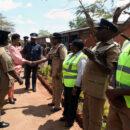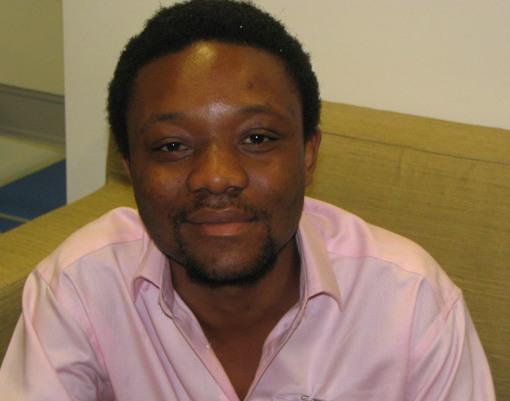Ruminations at the end of an assignment – Kieran Holmes bids farewell to Burundi

 Kieran Holmes is the first Commissioner General of the new Office Burundais des Recettes.
Kieran Holmes is the first Commissioner General of the new Office Burundais des Recettes.
As I look out my office window directly above the beautiful Lake Tanganyika, with the mountains of Congo barely visible through the haze, I am reminded of the words of William Butler Yeats written about another, very different, lake.
I hear lake water lapping with low sounds by the shore;
While I stand on the roadway, or on the pavements grey,
I hear it in the deep heart’s core.
Of course Yeats was writing from the point of view of an Irish emigrant in London remembering the lake waters of Lough Gill – a lake I happen to know very well having spent my youth in Sligo. While I am not an emigrant, having spent four years in Burundi leading the new revenue authority, I can’t help wondering in these last few days of my mandate, whether the sight and sounds of Lake Tanganyika will similarly resonate with me when I am very far away.
It was late 2010, but it seems like only yesterday, that colleagues and I marked exam papers in the basement of my home in Kiriri. We had sought to recruit 425 new staff for the fledgling revenue authority but ended up with over 9,000 applications and we gave an exam to 2,500 applicants. From these exam papers we selected the best 700 for interview. I’m proud to say that not only were the exams and interviews conducted in a totally sterile and transparent manner we ended up with a great mix of staff along ethnic, gender and regional lines. This exercise was a real eye-opener for people used to less transparent ways of doing business. Yes, it could be done – even in Burundi.
Over the years we made even more dramatic and bolder moves. We never could get a single office building for the revenue authority but we did manage to get and renovate a few good ones. And in those offices, we accomplished another first in Burundi by tearing down all internal walls and providing staff with a new way of working – open plan offices. Of course open plan offices are not new in many parts of the world and are not even universally regarded as the optimal means of organizing an office. But in Burundi this move sent out the twin messages of transparency and collaboration and that was what I wanted to achieve.
We went on to computerize our customs department and our back office functions, we designed and implemented new human resources policies and procedures, we formalized and adopted a Code of Conduct, we set up the attendant disciplinary committees that give effect to it and we trained staff using trainers from the other East African revenue authorities.
With the help of the African Development Bank and TradeMark East Africa we created three new one-stop border posts on Burundi’s borders and we set about renovating another 7 border posts. We piloted the Authorised Economic Operators scheme and we even prepared and signed an agreement for the exchange of best practices and mutual support in customs operations with Burundi’s only non-EAC neighbor – the Democratic Republic of Congo.
We also took great care to communicate what we were about and, crucially, why we were about it, to all our stakeholders. We held rallies up country and in Bujumbura, we published our revenue results every month and we held a quarterly press conference without fail at the end of each quarter. OBR staff participated in TV and Radio debates and we entered into contracts with various media houses for the regular publication of material.
Another first is the new Call Centre that is only awaiting a telephone line and which will provide up to the minute and accurate information to Burundians about the taxes they pay.
The new Office Burundais des Recettes (the OBR) had now come of age and we set about collaborating with other agencies. A single window for business registration was set up in partnership with the Investment Promotion Agency and the Commercial Tribunal and it is now possible to register a business and receive a taxpayer identification number inside of one hour in Burundi. A similar collaboration with the Land Registry office permitted quicker and sounder land transfers. Burundi shot ahead in the World Bank’s Doing Business Index, and was the only African nation in the top ten best performers for three years running.
As I write these words, OBR’s revenue collection for the six months ended 30th June 2014 is now approaching a sum that took a year to collect in 2009, before the OBR came into existence.
All of this brings me to yet another lake – Lough Erne – that hosted the G8 summit in 2013 and during which David Cameron espoused the need to focus on the three Ts, of Tax, Trade and Transparency. What I can say about this is that you can only have effective development interventions if you focus on all three Ts together. If you focus on one or miss one out, you lose the plot.
Many donors advocate trade as a pathway out of poverty and it is undoubtedly the case that increased trade is essential for economic development. But you cannot create an effective environment for business if there is not full transparency in the control and management of the public finances. And you cannot have the funds that are necessary for infrastructural development and business expansion without growing the tax base.
Burundi and the OBR are now at the crossroads.
A year out from Presidential and parliamentary elections, the government must choose a new Commissioner General for the OBR. In recent months, the OBR has lost its entire award-winning team of technical advisers and significant recruitments for senior and junior staff at the OBR are ongoing. This time I’m not involved and others are doing the work. The OBR has an ongoing budgetary problem and its 2014 budget still has to go before its board for approval.
Of course this perfect storm of disruption was entirely predictable but, sadly, unavoidable.
While OBR has made great advances in service delivery and revenue collection, the country’s tax to GDP ratio is at a very poor 13.3%. It needs to be at 20% for achievement of the Millenium Development Goals and at 25% to advance towards monetary union with other East African states. Only strong and decisive tax policy decisions will take the country toward these goals.
And if the OBR is to play its part in helping the country reach these goals, it can only do so if it is staffed and led by men and women recruited solely for their ability and their integrity. Anything less will mean failure.
Policy makers and Burundi’s donors alike should reflect well on these choices as the economic development of the country is at stake and the people living on the shores of Lake Tanganyika and elsewhere in Burundi deserve a better future.
In Burundi they have a lovely saying for people who are about to depart and that is “˜it is only mountains that never meet’. But, for the present, well, I shall arise and go now and go to Innisfree.
Kieran tweets from @kieran_holmes and may be contacted at [email protected].He co-authored a ‘Policy Voice’ for the Africa Research Institute in 2013: http://www.






